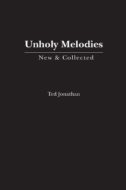 Ted Jonathan
Ted Jonathan
Unholy Melodies: New and Collected
NYQ Books
Reviewer: Shawn Pavey
Ted Jonathan is a poet known to many in the small press community. So, news of his passing in February of this year struck the community hard. I didn’t know him. I don’t know the circumstances surrounding his passing other than what I’ve heard from people who did know him, so there’s no reason to go into that. What I do know is that Ted Jonathan was a fine writer whose hardboiled, street-tough characters permeated his poems and stories with a gritty realism and devil-may-care approach to both actions and consequences.
What we find in Unholy Melodies is a collection of Jonathan’s previously published books and the final manuscript he was working on prior to his death. NYQ did a lovely job of recreating his earlier collections as scans from those original chapbooks and collections. The early pages appear as a folded and stapled 90s-era zine-ish chapbook, an aesthetic one recognizes instantly and misses desperately. We remember when poems could be manually typed, cut-and-paste assembled, xeroxed and folded and stapled and passed out for free at rock shows. Why wait for a book deal? Or an MFA? Write the poems, hand them out. These early poems feel like the best of what that punk DIY ethos produced. Sure, there are tales about street thugs, gamblers, junkies, sex workers, perverts: the whole gang’s here. But there’s no wallowing in ANY of it. These pages are, clearly, the work of a younger man who has not lost, completely, all his swagger. Hits taken, absolutely. Rough times known. Intimately. But there is a sly and delicious spark, a slow, glowing ember of whimsy in this early work that foreshadows the direction(s) Ted Jonathan’s writing would eventually take. Whimsy. In these poems, despite horrific circumstances or how completely sideways a grand scheme has gone, there are shining moments of jocularity that keep us from taking things too damned seriously.
The early poems contain a braggadocio that Jonathan’s later work does not. Continuing through this collection, one begins to see the evolution of the writer, Ted Jonathan. All of this work, the poems and the stories, is personal. We take, from the content of them, that The Writer had a heartbreaking childhood complete with a psychotically violent father, the early and tragic death of his mother, and serious mental illness. How much of this pieced-together narrative is autobiographical and how much is fabrication we don’t know. We see Jonathan’s work mature over time. The sentences tighten, the unnecessary language falls away. What remains is honest and pure and full of the grit and wonder of living. We see that, sometimes, surviving a thing is the best way through it. Sometimes, the best way to hear a perfect song is through the small, static-filled speaker of a transistor radio.
There is impressive music in this writing. The early work is flashy with pyrotechnics while still avoiding the pitfalls of predictable meter and hard end-rhymes. The early rhythms are brash, staccato explosions of syncopated consonance and assonance, sounds echoing more than repeating. This early work shows the great promise of the music to come, where over time, Jonathan’s writing releases its grip on frantic and immediate sonic impact in favor of a less frenetic but stylistically more complex palette. Even his prose is music. The stories are a hybrid of long-form flash fiction and prose poetry, but like his mid-career to later work, the language drops artifice and becomes honest. Much of that honesty feels like the voice of what we imagine a kid from a really tough background in the Bronx would grow up speaking. The music of Jonathan’s writing is the music of New York speech – concise, direct, pointedly real. You can hear the cadence of that speech, the rhythm of it, and how he drives that musicality to a clear and resounding ending.
One of the things I particularly enjoyed about the curation of this collection is how the earlier projects were kept completely intact. We get the discreet pleasure of seeing the same pieces return in subsequent books within this collected work. Seeing the subtle edits and revisions from earlier to later instances, we can see the development of Jonathan’s editor’s eye.
I could fill this review with quotes from Jonathan’s work, but I think that would be a disservice to this book. It is raw and honest and brutal and heartbreaking and disturbing. But there are also those quick glances of mirth, even in the darkness of despair and vicious violence, there are glimpses of maybe not light, but levity. Filling this review with quotations would threaten one’s experience of reading this book and the various creative arcs holistically.
The more I read this book and the closer I came to the end, the clearer it seemed that Ted Jonathan anticipated his own death. This was heartbreaking. His poems about his three cancers reveal such a tender vulnerability. The poems about his struggles with mental illness are unsettling. He displays the anguish of the illness, the sheer helplessness of it all, and asks not for sympathy or pity, but for relief.
The final poem in this collection is haunting and devastating and elegiac.
This book, in its raw and unflinching honesty, also brims with beauty. Life can, truly, suck sometimes. The kicks in the teeth can make one feel like it isn’t worth getting back up anymore. But, my god, there is such beauty when we do. When Ted Jonathan does. And in these final poems, we see hints that he knows he’s approaching the end. And he seems to have some peace about it.
Read this book. Say a toast to Ted.
I didn’t know him. I really regret that.

